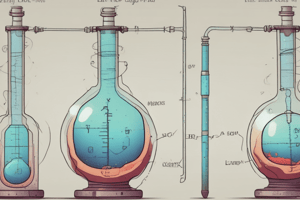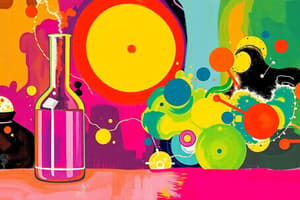Podcast
Questions and Answers
What is a characteristic of gases that distinguishes them from liquids and solids?
What is a characteristic of gases that distinguishes them from liquids and solids?
- Gases have definite shape
- Gases are not compressible
- Gases have high densities
- Gases expand spontaneously to fill their containers (correct)
Which of the following is a characteristic of gases related to their compressibility?
Which of the following is a characteristic of gases related to their compressibility?
- Gases are highly compressible (correct)
- Gases cannot be compressed
- Gases have extremely low densities
- Gases have definite shape
What is pressure in terms of gases?
What is pressure in terms of gases?
- The force acting on an object per unit area (correct)
- The volume occupied by a gas
- The mass of a gas molecule
- The force acting on an object at low temperature
Which property allows gases to diffuse and mix rapidly with other gases in the same container?
Which property allows gases to diffuse and mix rapidly with other gases in the same container?
What can different gases in a mixture do in a container?
What can different gases in a mixture do in a container?
Why do real gases deviate from ideal behavior at high pressure or low temperature according to the text?
Why do real gases deviate from ideal behavior at high pressure or low temperature according to the text?
In the Ideal-Gas Equation, what is the relationship between volume, number of moles, temperature, and pressure?
In the Ideal-Gas Equation, what is the relationship between volume, number of moles, temperature, and pressure?
According to Avogadro’s Law, how is the volume of a gas related to the number of moles of the gas?
According to Avogadro’s Law, how is the volume of a gas related to the number of moles of the gas?
For an ideal gas at STP (standard temperature and pressure), what are the conditions in terms of temperature and pressure?
For an ideal gas at STP (standard temperature and pressure), what are the conditions in terms of temperature and pressure?
What happens to the volume of a gas as its pressure decreases according to Boyle's law?
What happens to the volume of a gas as its pressure decreases according to Boyle's law?
If a gas has no volume and its particles are not attracted or repelled by each other, what type of gas is it?
If a gas has no volume and its particles are not attracted or repelled by each other, what type of gas is it?
What is the relationship between volume and temperature for a gas according to Charles's law?
What is the relationship between volume and temperature for a gas according to Charles's law?
What is the relationship between the average kinetic energy of gas particles and their Kelvin temperature?
What is the relationship between the average kinetic energy of gas particles and their Kelvin temperature?
In the ideal gas equation, what happens when both sides are divided by volume (V) and by temperature (T)?
In the ideal gas equation, what happens when both sides are divided by volume (V) and by temperature (T)?
How can the density equation be manipulated to find the molecular mass of a gas?
How can the density equation be manipulated to find the molecular mass of a gas?
What does Dalton's Law of Partial Pressures state?
What does Dalton's Law of Partial Pressures state?
In a stoichiometry problem, what does the stoichiometric factor represent?
In a stoichiometry problem, what does the stoichiometric factor represent?
What is the relationship between moles, molar mass, and mass in the ideal gas equation?
What is the relationship between moles, molar mass, and mass in the ideal gas equation?
What does the kinetic-molecular theory state about gases?
What does the kinetic-molecular theory state about gases?
How can the partial pressure of a gas in a mixture be related to the total pressure?
How can the partial pressure of a gas in a mixture be related to the total pressure?
When collecting a gas over water, why is it necessary to subtract the vapor pressure of water from the total pressure?
When collecting a gas over water, why is it necessary to subtract the vapor pressure of water from the total pressure?
In a gas mixture, what does partial pressure represent?
In a gas mixture, what does partial pressure represent?
What does Ptotal = P1 + P2 + P3 represent in relation to partial pressures?
What does Ptotal = P1 + P2 + P3 represent in relation to partial pressures?
When a gas is compressed at constant temperature, what happens to its pressure?
When a gas is compressed at constant temperature, what happens to its pressure?
What remains constant when volume increases at constant temperature?
What remains constant when volume increases at constant temperature?
What happens to pressure when volume increases at constant temperature?
What happens to pressure when volume increases at constant temperature?
What happens to the average kinetic energy of gas molecules when temperature increases at constant volume?
What happens to the average kinetic energy of gas molecules when temperature increases at constant volume?
How does an increase in volume affect the velocity of gas molecules?
How does an increase in volume affect the velocity of gas molecules?
What type of collisions occur between gas molecules and the container walls?
What type of collisions occur between gas molecules and the container walls?
Which speed is associated with the average kinetic energy of gas molecules?
Which speed is associated with the average kinetic energy of gas molecules?
Flashcards are hidden until you start studying




